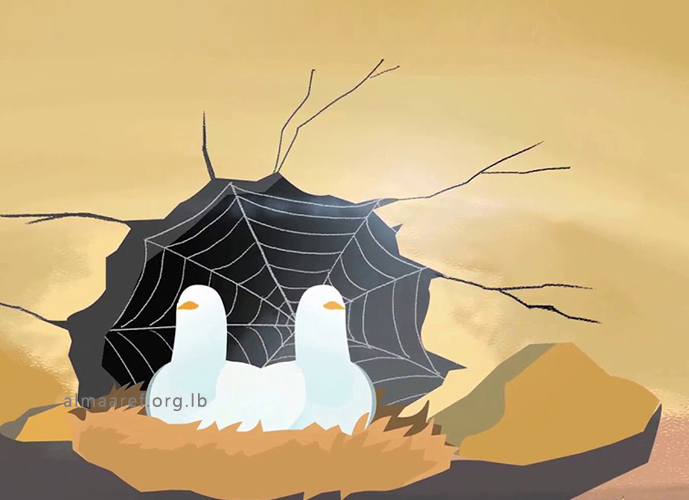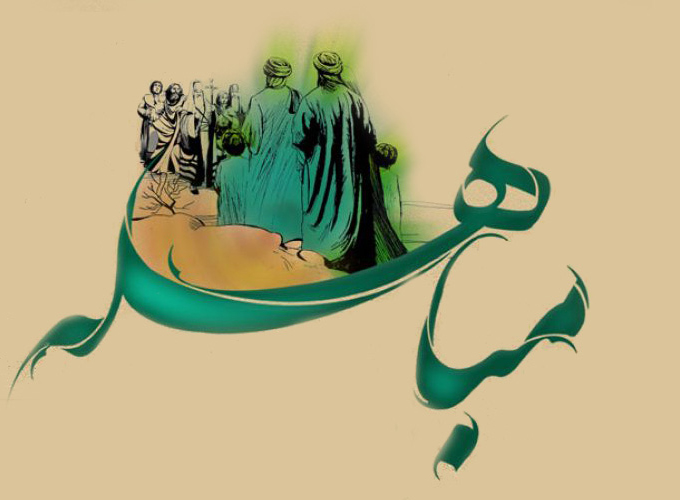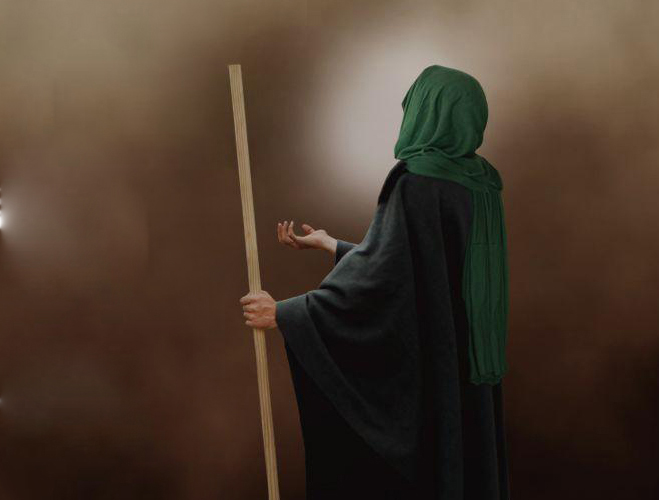The first periods of the salvation of the prophet Mohammad (pbuh) ended successfully by following a right plan where the prophet had resorted to The Cave of Thawr and hid there, failing the attempt of those who conspired against him.
The prophet Mohammad (pbuh) spent that time feeling peaceful without any worries or nervousness. He even rested his companion when he found him nervous in those sensitive moments saying: “Do not grieve; indeed Allah is with us”. [1]
He spent 3 days there, protected with God’s eyes and pampered with his care and kindness. It was reported by Al Sheikh Al Tusi in the Amali book that Al Imam Ali (as) and Hind bin Abi Hala (Khadija’s son) visited him (pbuh) many times. Abdullah bin Abi Baker and Amer bin Fahira who is the shepherd of Abi Baker also visited him many times (according to many historians’ stories).
Ibn Al Athir says: Abdullah bin Abi Baker used to respond to them during the day and visit them at night. He used to tend the sheep beside the cave so that when he leaves, he hides the remains of the sheep.[2].
Al Sheikh Al Tousi says in the Amali book: When Ali (as) and Hind entered the cave (after the night of prophet’s emigration), the prophet (pbuh) commanded Ali to buy two camels, one for him and the other for his companion. So abi Baker said: O prophet, I had prepared two camels for us to travel to Yathrib.
So the prophet (pbuh) said: I do not take them unless I pay their cost. Therefore, he commanded Ali (pbuh) to pay for Abi Baker the cost of the two camels[3].
One of the commandments of the prophet Mohammad (pbuh) to Imam Ali (as) in the cave at that night was to render his trust in the present of all of people in the basin-shaped, morning and evening: he who has a deposit with Mohammad, let him come to render trusts to their owners.[4]
Then he commanded him to take care of Al Fawatem (who are Fatima Al Zahraa the daughter of the prophet, the most beloved and prefered to him, Fatima the daughter of Asad, the mother of Al Imam Ali (pbuh), and Fatima the daughter Of Al Zabir and who wants to emigrate with him from Bani Hashem). He commanded him to organize their emigration to Yathrib and prepare what they needed from food and camels.
Here the prophet (pbuh) says the sentence that Ibn Tamima used as an excuse in his first proof:” O Ali, no one will harm you from now until we meet again”.
It is clear for the reader that the prophet (pbuh) said this expression when he commanded Ali (as) to render trusts to their owners, after the night of emigration.
That is, he commanded Ali to do so, and he said that sentence to him as he was preparing to leave the cave of Thawr.
Al-Halabi says in his biography: “The prophet (pbuh) commanded Al Imam Ali in one of the nights spent in the cave to render trusts to their owners in front of all people[5].”
Then it is reported by the author of the book “Al Dur” that he met him when he came out of the cave.
In conclusion: with the narration of a great sheikh from among the Imami Shiite sheikhs such as Sheikh Al Tusi with authentic resources that the command to return the deposits and trusts was issued by the Prophet (pbuh) to Ali (as) after the night Imam Ali sleeping in his bed, we have no right to oppose this correct transmission, and baptize to distract people with trifles. As for the narration of Sunni historians, this demand in another way suggests that all the commandments of the Prophet (pbuh) to Ali were completed in one night, the night of migration, so it is subjected to interpretation and direction because it is not excluded that their attention was focused on Narration of the origin of the subject, while they gave no importance for the circumstance of the issuance of these commandments and orders and the time of their statement.
Leaving the Cave:
Al Imam Ali (as) worked according to the commands of the prophet and prepared three swarms and a trusted guide named Ariqat to take them to Medina, so that the guide showed them their way then he sent all of that to the cave.
When the Prophet (pbuh) heard the camel’s murmuring or the call of the guide, he and his companion went down from the cave and rode the two camels and headed from the bottom of Makkah to “Yathrib” walking to that coastal line. The houses they passed through were mentioned in the Prophet’s biography of Ibn Hisham[6] and in Margins proven in the complete history of Ibn Al Atheer[7].
The First Page of History:
Yes, darkness covered the place, and the sun gathered its golden rays from this side of the globe to direct it to its other side of.
A group of Quraysh men who took every road in Mecca and its suburbs in search of the Prophet, three days and nights, returned to their homes, tired and exhausted. The Makkah-Madina road, which was closed for this purpose, was reopened after despairing of reaching the Messenger of God (pbuh[8]).
In these particular moments, the call of the guide, who was accompanied by three camels and a quantity of food, reached the ears of the Messenger of God (pbuh) and his companion while they were in the cave. He was saying in a low voice: We must benefit from the night darkness, and hurry up to leave the area of Makkah people, and choose a path that people less head to and no one is guided to it.
The history of Muslims begins with the year that included that exact night, and the Muslims made measurements of all events that occur in that year and thus determine its date and time.
The Leader of the Messengers (pbuh) - part 1, Ayatollah Al Sheikh Jaafar Sobhani
[1] Surah Al Tawba, verse 40
[2] Complete in history (Al Kamel fi Al Tareekh) , part 2, page 73
[3] Amali Al Sheikh, part 2, page 82 Freely
[4] Al Kamel, part 2, page 73. Aleppo biography, part 2 page 53
[5] Aleppo biography, part 2 page 35
[6] Biography of the prophet for Ibn Hashem, part 1 page 491
[7] Complete in history (Al Kamel fi Al Tareekh), part 2, page 75
[8] The History of Al Tabari, part 2, page 104



















